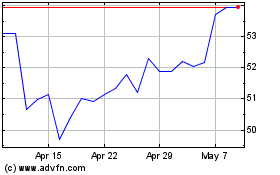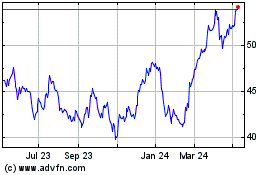TIDMLLOY
RNS Number : 5031V
Lloyds Banking Group PLC
13 December 2021
13 December 2021
LLOYDS BANKING GROUP PASSES BANK OF ENGLAND STRESS TEST
Lloyds Banking Group (the Group), together with seven other
financial institutions in the UK, has been subject to the 2021
solvency stress test, conducted by the Bank of England (BoE).
The Group has passed the stress test on both fully-loaded
(non-transitional) and transitional IFRS 9 bases, with the BoE
calculating the Group's CET1 ratio after the application of
management actions as 7.8 per cent, against the reference rate of
7.7 per cent. Despite the hypothetical severity of the stress test
scenario, the Group exceeds the capital reference rate after the
application of management actions and without the conversion of AT1
securities into equity (which contributed 2.1 percentage points of
capital in the 2019 exercise). The fully-loaded capital drawdown of
830 basis points, excluding transitional relief, represents a
significant 3.3 percentage point improvement (i.e. reduction) in
the fully-loaded capital depletion compared to the 2019 stress
test, as a result of the continued improvement in the quality of
the portfolio, capital base and different stress conditions. Given
this performance, the Group is not required to take any capital
actions.
This year's stress test assumes a significant slowdown in
economic activity, on top of the economic impact of the Covid 19
pandemic through 2020. This is one of the most severe stress tests
that the Group has faced, including a significant hypothetical
capital depletion in the first two years, followed by a steep
recovery in most macroeconomic indicators thereafter. Whilst there
is no significant market risk stress, this scenario includes a
severe UK deterioration which particularly impacts the Group as it
combines negative rates, in conjunction with significant falls in
property prices and GDP. In particular, base rates are assumed to
fall below zero in 2021 and remain negative until 2024,
unemployment increases to a peak of 11.9 per cent in the fourth
quarter of 2021, 2.7 percentage points higher than the peak in the
2019 stress test, whilst UK house and commercial property prices
both fall 33 per cent. GDP reduces by 9 per cent in the first year
and, combining the stress scenario with the economic decline in
2020, implies a cumulative three-year loss of 37 per cent of 2019
UK GDP.
In line with previous tests, this year's stress test runs under
the IFRS 9 accounting standard and requires the immediate
recognition of expected losses on a perfect foresight basis, rather
than reflecting incurred losses. The BoE assesses the stress test
results on an IFRS 9 transitional basis, in line with the phased
implementation approach. Results are also shown on an IFRS 9
fully-loaded basis. The low point post-management actions is the
same in both cases given the unwind of the 2020 transitional relief
in the fully-loaded view.
The Group's capital position remains strong, having reported a
CET1 ratio of 17.2 per cent and a UK leverage ratio of 5.8 per
cent, post dividend accrual, at 30 September 2021. The Group also
continues to be strongly capital generative with capital build for
the first nine months of the year of 159 basis points. As indicated
previously, any return of excess capital will be considered at year
end.
Further details
Details of the BoE's approach to the stress test and the
detailed results in relation to all participating financial
institutions are available from the BoE website.
For further information:
Investor Relations
Douglas Radcliffe +44 (0) 20 7356 1571
Group Investor Relations Director
douglas.radcliffe@lloydsbanking.com
Corporate Affairs
Matt Smith +44 (0) 20 7356 3522
Head of Media Relations
matt.smith@lloydsbanking.com
FORWARD LOOKING STATEMENTS
This document contains certain forward-looking statements within
the meaning of Section 21E of the US Securities Exchange Act of
1934, as amended, and section 27A of the US Securities Act of 1933,
as amended, with respect to Lloyds Banking Group plc together with
its subsidiaries (the Group) and its current goals and
expectations. Statements that are not historical or current facts,
including statements about the Group's or its directors' and/or
management's beliefs and expectations, are forward looking
statements. Words such as, without limitation, 'believes',
'achieves', 'anticipates', 'estimates', 'expects', 'targets',
'should', 'intends', 'aims', 'projects', 'plans', 'potential',
'will', 'would', 'could', 'considered', 'likely', 'may', 'seek',
'estimate', 'probability', 'goal', 'objective', 'deliver',
'endeavour', 'prospects', 'optimistic' and similar expressions or
variations on these expressions are intended to identify forward
looking statements. These statements concern or may affect future
matters, including but not limited to: projections or expectations
of the Group's future financial position, including profit
attributable to shareholders, provisions, economic profit,
dividends, capital structure, portfolios, net interest margin,
capital ratios, liquidity, risk-weighted assets (RWAs),
expenditures or any other financial items or ratios; litigation,
regulatory and governmental investigations; the Group's future
financial performance; the level and extent of future impairments
and write-downs; the Group's ESG targets and/or commitments;
statements of plans, objectives or goals of the Group or its
management and other statements that are not historical fact;
expectations about the impact of COVID-19; and statements of
assumptions underlying such statements. By their nature, forward
looking statements involve risk and uncertainty because they relate
to events and depend upon circumstances that will or may occur in
the future. Factors that could cause actual business, strategy,
plans and/or results (including but not limited to the payment of
dividends) to differ materially from forward looking statements
include, but are not limited to: general economic and business
conditions in the UK and internationally; market related risks,
trends and developments; fluctuations in interest rates, inflation,
exchange rates, stock markets and currencies; volatility in credit
markets; any impact of the transition from IBORs to alternative
reference rates; the ability to access sufficient sources of
capital, liquidity and funding when required; changes to the
Group's credit ratings; the ability to derive cost savings and
other benefits including, but without limitation, as a result of
any acquisitions, disposals and other strategic transactions;
potential changes in dividend policy; the ability to achieve
strategic objectives; management and monitoring of conduct risk;
exposure to counterparty risk; credit rating risk; instability in
the global financial markets, including within the Eurozone, and as
a result of uncertainty surrounding the exit by the UK from the
European Union (EU) and the effects of the EU-UK Trade and
Cooperation Agreement; political instability including as a result
of any UK general election and any further possible referendum on
Scottish independence; technological changes and risks to the
security of IT and operational infrastructure, systems, data and
information resulting from increased threat of cyber and other
attacks; natural pandemic (including but not limited to the
COVID-19 pandemic) and other disasters; inadequate or failed
internal or external processes or systems; acts of hostility or
terrorism and responses to those acts, or other such events;
geopolitical unpredictability; risks relating to sustainability and
climate change (and achieving climate change ambitions), including
the Group's ability along with the government and other
stakeholders to measure, manage and mitigate the impacts of climate
change effectively; changes in laws, regulations, practices and
accounting standards or taxation; changes to regulatory capital or
liquidity requirements and similar contingencies; the policies and
actions of governmental or regulatory authorities or courts
together with any resulting impact on the future structure of the
Group; projected employee numbers and key person risk; the impact
of competitive conditions; and exposure to legal, regulatory or
competition proceedings, investigations or complaints. A number of
these influences and factors are beyond the Group's control. Please
refer to the latest Annual Report on Form 20-F filed by Lloyds
Banking Group plc with the US Securities and Exchange Commission
(the SEC), which is available on the SEC's website at www.sec.gov,
for a discussion of certain factors and risks. Lloyds Banking Group
plc may also make or disclose written and/or oral forward-looking
statements in other written materials and in oral statements made
by the directors, officers or employees of Lloyds Banking Group plc
to third parties, including financial analysts. Except as required
by any applicable law or regulation, the forward-looking statements
contained in this document are made as of today's date, and the
Group expressly disclaims any obligation or undertaking to release
publicly any updates or revisions to any forward looking statements
contained in this document whether as a result of new information,
future events or otherwise. The information, statements and
opinions contained in this document do not constitute a public
offer under any applicable law or an offer to sell any securities
or financial instruments or any advice or recommendation with
respect to such securities or financial instruments.
This information is provided by RNS, the news service of the
London Stock Exchange. RNS is approved by the Financial Conduct
Authority to act as a Primary Information Provider in the United
Kingdom. Terms and conditions relating to the use and distribution
of this information may apply. For further information, please
contact rns@lseg.com or visit www.rns.com.
RNS may use your IP address to confirm compliance with the terms
and conditions, to analyse how you engage with the information
contained in this communication, and to share such analysis on an
anonymised basis with others as part of our commercial services.
For further information about how RNS and the London Stock Exchange
use the personal data you provide us, please see our Privacy
Policy.
END
MSCFLFEDFTLVLIL
(END) Dow Jones Newswires
December 13, 2021 13:03 ET (18:03 GMT)
Lloyds Banking (LSE:LLOY)
Historical Stock Chart
From Oct 2024 to Nov 2024

Lloyds Banking (LSE:LLOY)
Historical Stock Chart
From Nov 2023 to Nov 2024
